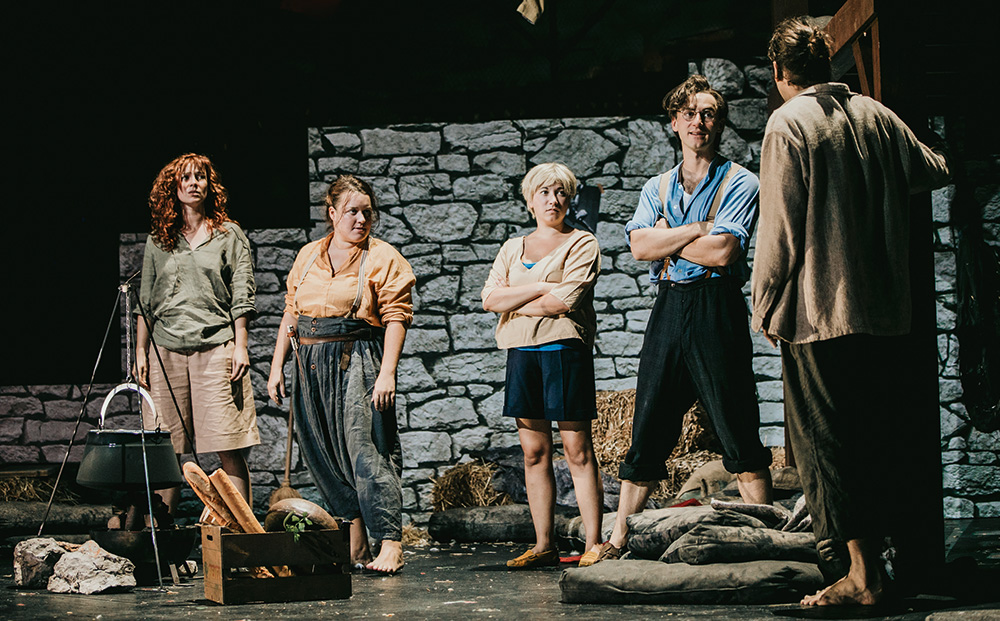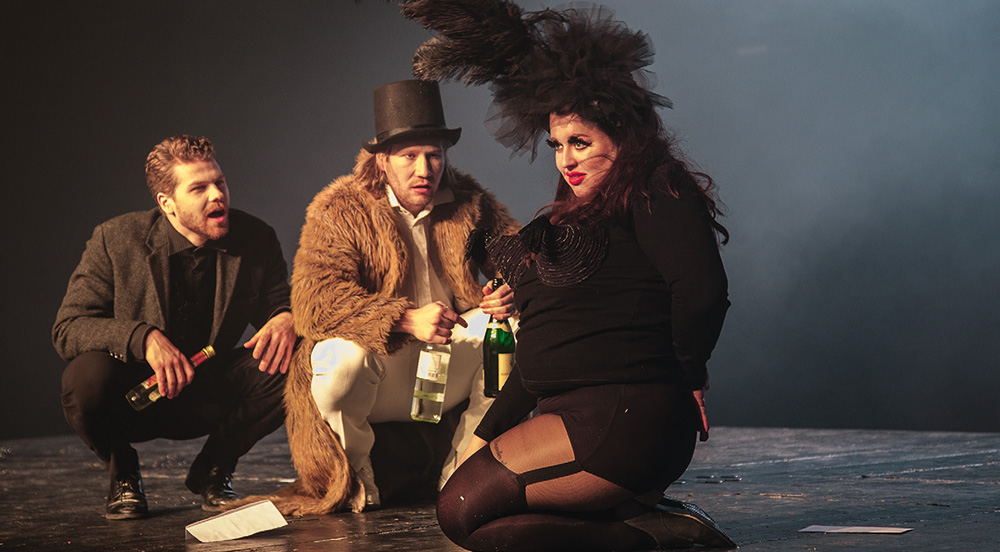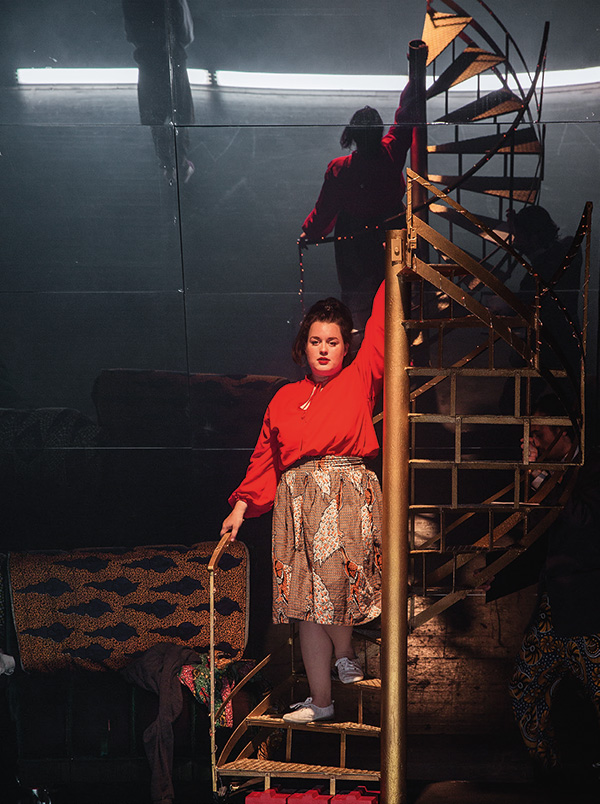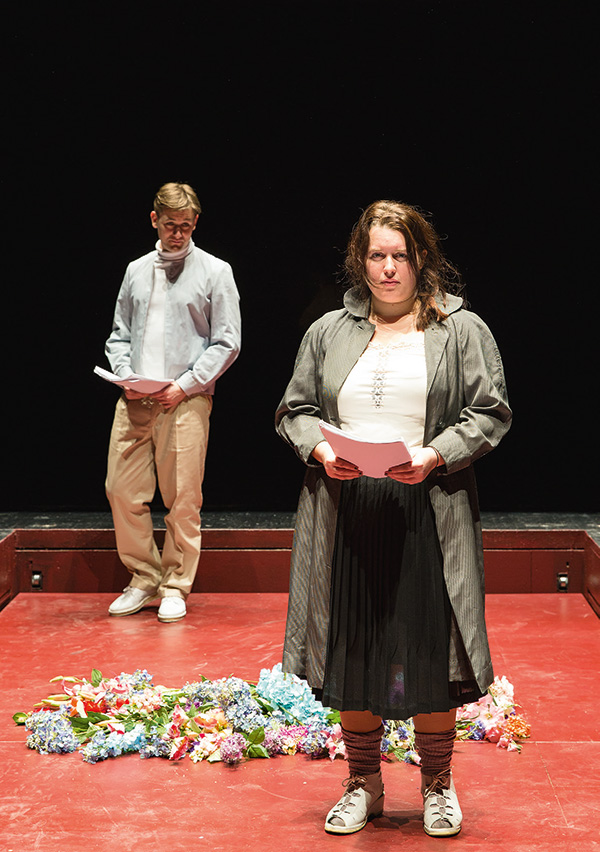Those who attended productions of the Max Reinhardt Seminar during the academic year of 2017/18 will hardly have missed her: 3rd-year student Lisa-Maria Sommerfeld. The 24-year-old German actor spoke with mdw Magazine about her fear of the acting profession, her plans for the future, and why she wants to play Jedermann in Salzburg.

It all began with the Disney musical Beauty and the Beast: for her 5th birthday, Lisa-Maria Sommerfeld had been given tickets to see it in Stuttgart. “And suddenly, that movie—which I’d been watching over and over at home—came to life on stage with real people. It was a transformation that interested and fascinated me. And from then on, I had this thing about putting Disney movies on stage,” she says about her professional dreams back then with a laugh. She then gradually became interested in theatre as such and began performing with her school theatre group while her interest in musicals faded away. And all the while, she never wanted to become anything other than an actor. After graduating from secondary school, she first worked in shops before eventually daring to audition at the Ernst Busch Academy of Dramatic Arts. “The closer that came, the more afraid I got. And then they didn’t take me.” After a further failed attempt, this time in Linz, she succeeded in gaining admission to the Provincial Conservatory in Carinthia. “Once arrived, I pretty soon had the good fortune to be seen by a director from the ensemble neuebuehnevillach who’d come there to cast roles,” she recalls of her initial ticket onto Austrian stages. She spent the next year playing in various productions and ended up hardly attending her school until a colleague pointed out to her that, despite everything, having real formal training was actually important. “It’s about technique. After all, acting is also a craft.” Said colleague eventually registered her for an audition at the Max Reinhardt Seminar, even going there with her personally. “So I entered these halls for the first time, and it was like I’d been suddenly switched on—and I thought to myself: Okay, I’m gonna get in here!” And so it was. Due to on-going engagements, however, she only began studying in Vienna one year later. When she did start, she had to rethink some things she’d picked up during her two years of theatre experience in Carinthia. “I was forced to realise that a lot of what I’d been projecting before could be much more easily realised by just being authentic. Authenticity requires more courage, though.”

She still does grapple with fear—but it’s not stage fright; her fears have more to do with the profession itself. “When I stand onstage, I don’t think about anything else. Fear only returns when I go offstage and think about stuff more objectively. What I’m most afraid of is unemployment and not being able to remain true to my own values—and that I might someday no longer think what I’m doing is good,” she says of the apprehensions that accompany many actors. “I think everyone worries about not being able to launch their career, not having opportunities to act—and that they’ll have to consider doing something else.” Although she’s absolutely happy with her choice of major and with the programme at the Max Reinhardt Seminar, there have also been moments when she would’ve most liked to throw in the towel completely. “I had one moment where I just couldn’t go on, and then I called up my teacher Nicholas Ofzcarek. He sat down with me, listened to my concerns, and advised me to let a little time pass and—most importantly—to just live a little bit. And that was a great thing for me.” Her first year of study also wasn’t always so easy because she had to work on the side. “I found it extremely difficult to open up all day at university, to learn and be alert, and then to wait tables at a pub in the evening.” But above all, her time at the mdw also taught her that one sometimes needs to ask for help if classes and rehearsals lead to scheduling conflicts or if something else gets to be too much to handle. “You have to learn to open your mouth and define what you want; if you do so, everyone will listen, and you’ll receive immediate help.”

And if something during one’s studies doesn’t work 100%, she says, it’s not a catastrophe: “One role that‘s burned into my memory is that of Annie in Anatol. I’d been totally sick during the rehearsals, and I’d also had to rehearse for another production, so we ended up going on stage very ill-prepared. That experience showed me how you can also pull something off that hasn’t yet been perfectly worked out down to the last cosmetic details. If there’s trust and a common goal, you can make it work.” The Max Reinhardt Seminar is a place where one can make mistakes. “It’s a protected space. After all, we’re all still learning.“ This September, she celebrated her première at the Vienna Volkstheater in Die rote Zora und ihre Bande, directed by Robert Gerloff. “At first, I was extremely intimidated by the Volkstheater. But then I saw how things actually run just like they do at the Reinhardt Seminar. So it’s all really ‘just’ theatre, no matter where you are.” The differences she notices are evident above all in rehearsals—while everyone’s constantly learning tons of things for themselves at the Max Reinhardt Seminar, one can learn a lot simply from the other ensemble members at the Volkstheater. “I’m performing there with people who’ve been in the profession for 20 or even 30 years—and watching them rehearse is just insane. You learn so much every single minute,” she exclaims, happy for this valuable experience.

Her ultimate acting dream is to play the title role in Jedermann. “As far as that goes, I have to say that Jedermann—and this may sound a bit trite—saved my life.” During a phase that wasn’t going so well for her, Lisa-Maria was given tickets for a production at the Salzburg Festival. Expecting an opera, she wasn’t all that motivated—for which reason she was all the more surprised by what she ended up seeing. “Nicholas Ofzcarek walked onstage, and I just thought: ‘Wow’. It was another Beauty and the Beast moment for me, but different and incredibly deep. And then I knew: that’s a role I want to play.” Her fascination with male roles is something she put on display as early as her entrance exam, for which she played Mephisto. What interests her is leaving established norms behind. “People always severely underestimate the audience. It’s just assumed that they always want to see the ensemble’s prettiest member as Julia, or that they can only manage two classics and two extremely modern works per year. It would be nice to get beyond that and risk more.” Both onstage and backstage, the young actor clearly perceives theatre as being anything but pure entertainment. “For me personally, a big concern is women and the concept of women that’s being worked with in theatre and at the theatre. I always question female characters quite intensively and try to get to the bottom of just why I’m supposedly ‘this type’ that’s been assigned to me and why I get compared with certain women—and how all that might be if I were a man.“
She’s best able to relax and escape from theatre life when taking a long walk out in nature with her best girlfriend and the dog they share. “I’ve also made myself a rule: when I come home, my mobile phone gets switched off. I miss a lot of great parties, I think, because I just don’t go. I tune all that out, because I really do need to withdraw. I’m such an old granny,” she says with a laugh.
Alongside Nicholas Ofzcarek, her role models include Markus Meyer—“who I think is a master of self-transformation”—as well as Maria Happel and Stefanie Reinsperger. Her current plan for the future is to remain in Austria, to also get into film acting, and to perform at truly important venues. “Except for the Salzburg Festival, I’m fairly relaxed about where I want to go. Sure, I’m itching to conquer the big stages—above all because they’re just so big and you can really rock ‘n’ roll on them. But maybe it’ll ultimately all be different, and I’ll be happiest standing amidst five chairs on some stage in Mecklenburg-Vorpommern.” For her, the fascinating thing about her profession is above all the opportunity to transform herself and to test her limits: “The fact that I can breathe my life and my body into a figure and say, ‘Hey look, this is how Jedermann or Julia looks now!’—and that’s exactly how it is, and then I see it through without compromise. That’s what interests me.“

